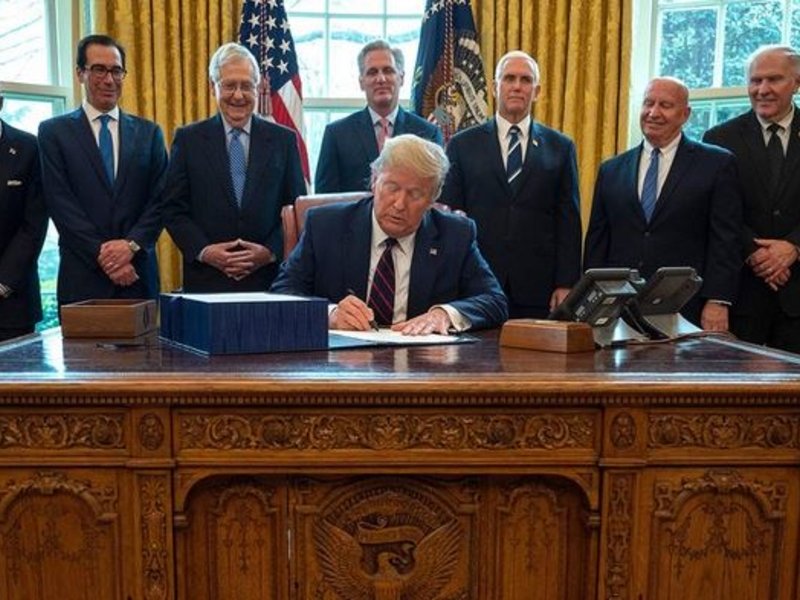
President Donald Trump signed into law the largest stimulus package in U.S. history Friday as part of the response to the economic crisis caused by the coronavirus pandemic.
“This will deliver urgently needed relief,” Trump told reporters at the White House, as he was joined by GOP leaders but no Democrats. “We’re going to keep our small businesses strong and our big businesses strong.”
The House passed the $2 trillion package by voice vote earlier Friday, after the Senate’s 96-0 vote Wednesday to approve the measure.
“Our nation faces an economic and health emergency of historic proportions,” House Speaker Nancy Pelosi said before the vote. “We do know that we must do more.”
The auto industry has not sought specific aid in the package, but rather would benefit from the overall economic support promised by the legislation. Dealers stand to get aid through small business loans and other incentives.
The National Independent Automobile Dealers Association applauded the bill’s passage. The association said Friday that new law will provide “vital support” for independent dealers and other small businesses.
“Government tends to move slowly, so we congratulate members of Congress and President Trump for reacting quickly in this time of crisis,” NIADA CEO Steve Jordan said in a statement. “The aid included in this legislation will make a huge difference to independent dealers as we attempt to weather this storm.”
Congressional action comes as the U.S. is reeling from the effects of the global health crisis. Infections in the U.S. have topped 92,000, passing the number of cases in China where the disease first emerged. Unemployment claims spiked to 3.3 million last week, dwarfing previous highs in Labor Department reports published since 1967.
“To the American public, if you do your part, I promise we will do ours,” Republican leader Kevin McCarthy said Friday. “We are going to help Americans through this. We are going to do this together.”
The size of the stimulus package is unprecedented, surpassing the approximately $800 billion Obama stimulus that passed five months after the 2008 financial crash. Together with Federal Reserve actions, the legislation will amount to a injection of $6 trillion into the economy, according to White House economic adviser Larry Kudlow, or about 30 percent of annual gross domestic product.
Friday’s House vote took place under unusual circumstances, with two members of the House known to be infected with the coronavirus and others placing themselves in quarantine because of possible contact.
Rep. Thomas Massie, a Republican from Kentucky, angered many of his colleagues — and Trump — by insisting on a vote procedure that requires the presence of at least half of the House members. Lawmakers gathered on the House floor and in the visitor’s gallery to provide a quorum while maintaining the social distance recommended to avoid spreading the virus.
Enactment of the bill will send direct payments to low- and middle- income Americans, and the unemployed will receive expanded benefits through at least July. Companies of all sizes will have access to emergency financing and tax breaks if they retain employees.
Stocks rose sharply this week as the Senate completed work on the bill. The S&P 500 had its best three day increase since 1933 before declining as much as 4 percent Friday.
Pots of money
The package provides about $500 billion in loans and assistance for big companies, provided they do not conduct stock buybacks and retain most employees. Airlines are eligible for grants in exchange for giving the government equity stakes.
There is a separate pot of about $350 billion for small businesses loans, which won’t have to be paid back if used to to make payroll or pay mortgage interest and rents.
For individuals, the relief measure includes direct payments of $1,200 for each adult and $500 for each child, with the payment phasing out for individuals making more than $75,000 per year and couples making more than $150,000. Those without income, or with income solely from government benefits, like seniors on Social Security, are eligible. Individuals making above $99,000 and couples making more than $198,000 receive no payment.
The stimulus provides funding to allow states to boost weekly unemployment benefits by $600 through July 31. Maximum state benefit range from $235 in Mississippi to $823 in Massachusetts depending on income. The added boost would be four months for those laid off now, but less time for those losing their jobs closer to July.
Other benefits
Those affected by the virus would be allowed to take up to $100,000 out of their employer-sponsored retirement funds without penalty. It also would let older retirees avoid having to sell retirement investments in a down market by waiving minimum distribution requirements for Individual Retirement Accounts. Students get relief from student loans, and some mortgage holders with government backed loans will be able to delay payments.
The package also contains $340 billion in emergency supplemental funding for government and local efforts stem the outbreak. That portion includes $117 billion for hospitals and veterans’ health care.
Congress has now enacted three major bills in response to the coronavirus pandemic, including an $8 billion bill funding agencies tasked with fighting the disease and a $100 billion measure focused on providing paid sick leave to workers to encourage them to stay home if infected.
Lawmakers have already begun discussing a fourth stimulus measure. Democrats want to see stronger workplace protections, more money for hard-hit states like New York, expanded food stamp benefits and expanded family leave for those caring for COVID-19 patients.
Pelosi on Thursday predicted another round of direct payments and expressed hope for infrastructure spending.
“The interest rates are low,” Pelosi said. “The chairman of the Fed, Mr. Powell, said to me, ‘the interest rates are as low as they’ll ever be. Think big because whatever you borrow to do with this is going to be at the lowest interest.’“
Audrey LaForest contributed to this report.